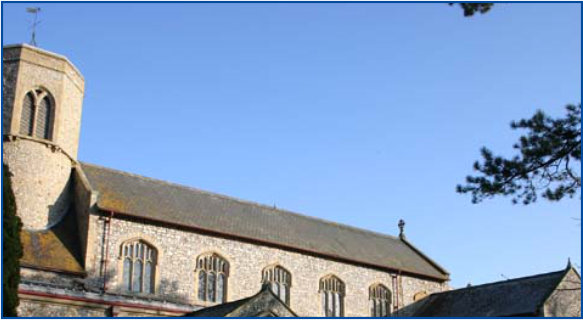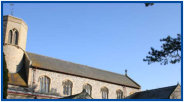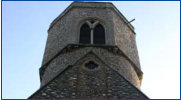
© The Docking Benefice The Vicarage, Sedgeford Road, Docking PE31 8PN Telephone: 01485 517157
The Docking Benefice






Sedgeford
The Church of St. Mary the Virgin, Sedgeford
Sedgeford has traces of earlier settlements going back to Neolithic times. There may have been early Christians too, during the Roman occupation (there was a Roman Villa here) but after the Romans left, any pockets of Christianity there may have been, dwindled away and pagan Saxons gradually moved in. East Anglia became Christianised in the 7th century, following Augustine’s arrival in Kent in 595 AD, and that of Felix at nearby Babingley in 633. The Saxon village was about 500m east of the present Church, on the other side of the river. Its recently excavated cemetery, which dates back to the 8th century, contains many Christian internments. There would have been a small Church close by. This earlier site was abandoned and the village re- established around the site of this ‘new’ Church, built close to the manor of the de Sedgefords, probably about the time of the Norman Conquest.St. Mary’s Church, as it is today, evolved from
its foundation in the late 1200s over a period
of about 200 years. The main feature of the
church is its round Tower, one of 181 in
England (not all intact) and 126 in Norfolk. Its
unusual West front, with the ends of the aisles
extended flush with the tower, is unique.
Before the Reformation of 1534 the Church
was in the care of the Prior and Monks of
Norwich Priory. In 1841, the Church had
become very dilapidated (the congregation
had to use their umbrellas inside the Church)
requiring an urgent rescue operation and later
restoration (1882) resulting in a new roof, pews and furniture. Before that time, the Church had
been used by smugglers, who utilised the little used South porch for temporary storage
Faded figure of St. Christopher carrying the Christ Child
A very faded figure of St. Christopher carrying the Christ Child is seen on the wall of the South aisle, close to a consecration cross. Both are late 14th Century, when the aisles were enlarged. There are some 17th century graffiti inside the Tower Arch (and more modern ones behind the organ). The organ was made by W C Mack of Great Yarmouth and dates from 1862. A fine instrument, it has been awarded a certificate by the British Institute of Organ Studies and is listed as a historic pipe organ of importance to the National Heritage.A memorial on the left hand gatepost
of the Lych gate
There is a memorial on the left hand gatepost of the Lych gate to the typhus epidemic of 1852, when in a five month period there were 20 fatalities out of the 150 villagers affected. The present Lych gate is a recent replacement of the Victorian original of 1852. The light above the gate is “To those who kept the light of freedom burning” and who died in the war of 1939-1945. From 2011 to 2016 the church underwent extensive restorations and improvements. Roofs and drains were repaired and replaced and a toilet and improved heating were put in to make the church building more comfortable and so, more easily usable for both our congregation and other community groups. There is a strong sense of community in Sedgeford and the church has become a base for SHARP’s team of archaeologists to give public talks and lectures. It also houses our men’s breakfast group and has been used for other talks and exhibitions that have served the community in our village and beyond.



Contacts
Churchwardens Janet Frost Pam Goddard Treasurer Michael Nicholson PCC Secretary Michael Stafford
Information
Post Code: PE36 5NA
Church Lane
Sedgeford

Any enquiries please contact
Pam Goddard T: 01485 579002
E: pamgoddard@btinternet.com


© The Docking Benefice The Vicarage, Sedgeford Road, Docking PE31 8PN Telephone:
01485 517157
The Docking Benefice






Sedgeford
The Church of St. Mary the
Virgin, Sedgeford
Sedgeford has traces of earlier settlements going back to Neolithic times. There may have been early Christians too, during the Roman occupation (there was a Roman Villa here) but after the Romans left, any pockets of Christianity there may have been, dwindled away and pagan Saxons gradually moved in. East Anglia became Christianised in the 7th century, following Augustine’s arrival in Kent in 595 AD, and that of Felix at nearby Babingley in 633. The Saxon village was about 500m east of the present Church, on the other side of the river. Its recently excavated cemetery, which dates back to the 8th century, contains many Christian internments. There would have been a small Church close by. This earlier site was abandoned and the village re- established around the site of this ‘new’ Church, built close to the manor of the de Sedgefords, probably about the time of the Norman Conquest.St. Mary’s Church, as it is today, evolved
from its foundation in the late 1200s
over a period of about 200 years. The
main feature of the church is its round
Tower, one of 181 in England (not all
intact) and 126 in Norfolk. Its unusual
West front, with the ends of the aisles
extended flush with the tower, is unique. Before the Reformation of
1534 the Church was in the care of the Prior and Monks of Norwich
Priory. In 1841, the Church had become very dilapidated (the
congregation had to use their umbrellas inside the Church) requiring an
urgent rescue operation and later restoration (1882) resulting in a new
roof, pews and furniture. Before that time, the Church had been used by
smugglers, who utilised the little used South porch for temporary
storage
Faded figure of St.
Christopher carrying the
Christ Child
A very faded figure of St. Christopher carrying the Christ Child is seen on the wall of the South aisle, close to a consecration cross. Both are late 14th Century, when the aisles were enlarged. There are some 17th century graffiti inside the Tower Arch (and more modern ones behind the organ). The organ was made by W C Mack of Great Yarmouth and dates from 1862. A fine instrument, it has been awarded a certificate by the British Institute of Organ Studies and is listed as a historic pipe organ of importance to the National Heritage.A memorial on the left
hand gatepost of the
Lych gate
There is a memorial on the left hand gatepost of the Lych gate to the typhus epidemic of 1852, when in a five month period there were 20 fatalities out of the 150 villagers affected. The present Lych gate is a recent replacement of the Victorian original of 1852. The light above the gate is “To those who kept the light of freedom burning” and who died in the war of 1939-1945. From 2011 to 2016 the church underwent extensive restorations and improvements. Roofs and drains were repaired and replaced and a toilet and improved heating were put in to make the church building more comfortable and so, more easily usable for both our congregation and other community groups. There is a strong sense of community in Sedgeford and the church has become a base for SHARP’s team of archaeologists to give public talks and lectures. It also houses our men’s breakfast group and has been used for other talks and exhibitions that have served the community in our village and beyond.



Contacts
Churchwardens Janet Frost Pam Goddard Treasurer Michael Nicholson PCC Secretary Michael Stafford
Information
Post Code: PE36 5NA
Church Lane
Sedgeford
















